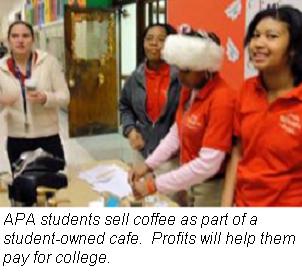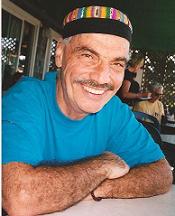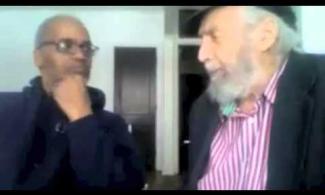Permanent link to this article: http://geo.coop/node/446
In High School, In College: Education for Workplace Democracy is "Alive"
(Editors' introduction: GEO editor-at-large Len Krimerman helped organize a workshop on "Education for and in Workplace Democracy" last summer, at the Eastern Conference of Workplace Democracy Conference in Pittsburgh, so we figured he might have some good stories to share for this "education" issue. These days, he is often hard to track down, but we eventually caught up with him at home, trying to unwind - when he should have been preparing for a GEO conference call. Shamed, he agreed to an interview.)
GEO: Tell us about that ECWD workshop - what were the highlights?
LK: It was a remarkable session, with three presentations that diverged wildly as far as their content, but which provided very similar and hopeful lessons. Hazel Corcoran, Executive Director of the Canadian Worker Cooperative Federation, started things off by detailing numerous initiatives, of many different sorts, now under way around education, cooperatives, and social justice within Canada. I was especially struck by the variety of creative digital opportunities that support peer-to-peer learning among cooperatives launched by the "Coop Zone," a Canadian network of people and organizations that helps others to start and develop cooperatives.
GEO: Hazel's presentation is actually published in this GEO issue, so perhaps we can move on to the rest of the workshop?
Austin Polytechnical Academy: An innovative high school teaches students about worker ownership LK: Sure. Next up was Carl Davidson, who gave a rousing and fascinating talk about Austin Polytechnical Academy (APA), a new public high school located in a primarily African-American neighborhood in Chicago. Carl was part of its design team, and he made the process leading up to this innovative academy just as intriguing as its extraordinary curriculum.
LK: Sure. Next up was Carl Davidson, who gave a rousing and fascinating talk about Austin Polytechnical Academy (APA), a new public high school located in a primarily African-American neighborhood in Chicago. Carl was part of its design team, and he made the process leading up to this innovative academy just as intriguing as its extraordinary curriculum.
GEO: How does APA connect to education for workplace democracy? Do the students learn about worker cooperatives, or perhaps apprentice in them?
LK: There is a heavy emphasis at APA on teaching students high-level industrial, engineering, IT, and management skills. Amazingly, this includes learning about worker created, managed, and owned enterprises, together with a focus on Mondragon, the highly industrialized, unusually successful, and largely worker-owned network of enterprises in the Basque region of Spain. Last October, students actually visited Mondragon for two weeks to examine its labor-based enterprises and its technological inventiveness. You can read about their trip and lots more at www.austinpolytech.com.
It's an engaging, inspiring story, not least because APA is showing us all what's really needed to make education work well: a progressive, inventive, challenging curriculum within a welcoming and supportive community. This, so it seems to me, is what virtually all learners need and want, and what in general is so hard to find anywhere in the established educational system. That system, as the poet Yeats put it, in general conceives of education as schooling and schooling as "filling an empty bucket", rather than as "lighting fires".
GEO: You mentioned that the process that led to APA's founding was itself remarkable. How so?
LK: For one thing, APA's design team and vocal supporters represent a very diverse coalition of workplace democracy activists, the Austin community itself, small manufacturing businesses in Chicago, as well as teachers and the teachers' union. Each brought something to contribute to, and found something beneficial in, the APA vision. For example, the manufacturers are able to recruit well-trained interns, shadow apprentices, and employable grads, rather than continuing to search for these outside of Chicago.
Over the past two decades, the Austin neighborhood had received ongoing support from workplace democracy and re-industrialization activists. Carl himself had taught after-school computer skills classes to high schoolers. Many battles to prevent plant closings, layoffs, corporate runaways, etc. had been fought, most of them lost. But the activists' efforts had generated trust within the Austin community; they were seen as in for the long haul, and this was crucial in gaining community confidence in this new struggle for their childrens' education. The lesson here, as Carl pointed out, is that even if you lose at first on taking a courageous and progressive stand, you are still having an impact, and this can later yield important gains, so long as you stick around. (Contact Carl at carld717@gmail.com; also, see his blog).
GEO: How did your own presentation fit with these first two?
LK: Mine went in yet another direction, for example, how to bring democracy, in many forms, into a mainstream university. Two years ago, two students, a new Director of Student Activities, and myself began developing a program at the University of Connecticut (UCONN) not embedded in traditional academic departments. Our vision was a "trans-disciplinary" program which would lead to a Bachelors degree, provide students with numerous off-campus learning opportunities to develop as creative social justice activists, while drawing in a full way on the wisdom of both community-based practitioners and engaged academics.
University of Connecticut's Public and Community Engagement helps students build cooperative economy
One important part of this program, now called Public and Community Engagement, provides classroom and hands-on experience in "building a cooperative economy". Erbin Crowell, who was with Equal Exchange for a dozen years and is now a cooperative developer with Cooperative Fund of New England, teaches PACE students, and others, about cooperatives in both online and regular classroom settings. But PACE also focuses on building bridges between cooperative enterprise (or workplace democracy) and other social justice aims and organizations: non-violent peace-building; citizen dialogue and deliberation; democratic education; popular art and community-based culture.
Magically, we found a welcoming part of the University for our trans-disciplinary program, the Center for Continuing Studies. CCS offers a Bachelor of General Studies focused on so-called "non-traditional students", e.g., those returning to finish an undergrad degree as well as those unwilling or not ready to choose a single academic major. Nowhere else on our campus would such a program have been able to find a home: not just because PACE refuses to confine students to one single or rigidly specialized set of courses, but because we bring community practitioners in as part of our instructional team based on their practical experience and teaching capabilities, rather than on their advanced degrees.
GEO: So what's the "takeaway" from PACE for workplace democracy and our readers?
LK: There's a bunch of implications. First, like APA, it may provide a potentially replicable way to build a supportive place for workplace democracy - not just a single course or so - within the mainstream "higher ed" establishment. Activist students at UCONN have been drawn to our courses and to the practitioner-mentors who join with academic faculty in teaching them. Two of these students are now co-teaching a one credit First Year Experience course on "activism" in which opportunities offered by PACE are continually referenced. The word is spreading, as well, to our community college partners in the region.
Many universities, as well as community and junior colleges, have Continuing Studies, Continuing Education, or Adult Education divisions that can actually - albeit modestly - compensate people who teach about cooperative enterprises, workplace democracy, solidarity economy, etc. In some cases, such as UCONN, an entire degree-oriented program could be launched within these much more flexible places, which tend to place teaching and community engagement well over publishing in academic journals. In others, a non-degree "certificate" program focused on experiential learning within - or to actually start - democratically controlled enterprises might well attract students who otherwise find little of interest, and/or no career options - in conventional academic programs. This semester, e.g., three students transferred from other parts of UCONN to the PACE BGS program; this to the delight of the administrative staff which supports our program.
Amazing impact
GEO: Recently, it seems that PACE has had a significant impact within the nearby town of Willimantic, in eastern CT. Can you tell us about this?
LK: I'd prefer to say that we now have an amazing opportunity to make a real and positive impact. Last November, ACCESS, our local Community Action Agency, received stimulus funds which, at least in part, it decided to use in an unusually selfless and progressive way. Rather than adding new staff or supporting any of its established programs, it created a grant program called "Breaking the Cycle of Poverty", and threw it open to any and all in the Willimantic, CT area.
Thus far, six grants of $10,000 each have been awarded, and PACE-connected folks have won four of them. This gives us $40,000 to start building a cooperative economy together and with our community partners; a truly wonderful opportunity, the stuff of dreams. The four initiatives include:
- A Youth Digital Media Cooperative in which UCONN students will be working with high school students to provide them with web-based skills and the opportunity to use them to benefit community businesses and organizations and make an income from that;
- A Cooperative Licensed Commercial Kitchen (CLiCK), through which member individuals and groups can prepare and sell prepared foods;
- Rays of Hope, which is working to help overcome housing and employment barriers facing former addicts or people with legal offense histories;
- Willimantic Cooperative Hub, which will be developing a business plan for a Cooperative Outreach and Entrepreneurship Center, as well as supporting the art and artisan communities in Willimantic, for example, through Cooperative and Art (street and gallery) festivals scheduled for the next six months, which we hope to turn into annual events.
The first of these was put together by some of our PACE students, who are now working with high school students in Willimantic to help form the digital media co-op. Last Spring, several of them took courses from Erbin, which included an exercise of identifying a cooperative worth creating and the process of getting it started. This is immensely exciting for them, and for the whole program as well.
The four of us have agreed to "inter-cooperate", and are eyeing a two story rental building on Main Street in downtown Willimantic which, together with art organizations and others, we might be able turn into a "cooperative incubator and education" space.
GEO: Do you see all of this as an anomaly or as readily replicable?
LK: At this point, a bit of both. What ACCESS did with its stimulus money is seemingly risky, and probably unique. Should we succeed however in developing ways out of poverty in Willimantic, other agencies - state, federal, non-profit - may well take notice and follow suit. So we could say that it's potentially replicable.
Anarchist education
GEO: Let's switch direction a bit. You presented on education at another conference this Fall. Did you talk there about PACE as well?
LK: That was a different sort of audience, and a different experience for me: I was at the First Annual North American Anarchist Studies Conference, held in Hartford, CT. I came there with a deliberate challenge for anarchists to reclaim their own form of educational innovation. This, I said, was well-framed by Paul Goodman in his Community of Scholars book as a secession from mainstream or conventional education, but it appears in different forms in most of the better known anarchists: think here of "free schools", the modern school movement, Tolstoy's school at Yasnaya Polyana, William Godwin on the "communication of Knowledge", and Ivan Illich on deschooling society.
One prudential rationale for this secessionist or self-organizing form of education can be drawn from the dark side of mainstream education. Anyone who has initiated change within that system knows full well that it is always a pitched uphill battle and provides only the most tenuous and insecure results. A sympatico Dean retires and the next one sweeps away years of successful innovation without a shred of remorse (or recourse). The lesson for PACE and similar programs are clear: they must work on both legs, one inside the academy and the other outside it, or in support of non-establishment and self-organized forms of education.
GEO: So what was the reaction from this anarchist audience to your challenge?
LK: It blew me away. Two hands went up immediately after the presentation with the exact same - and humbling - response to my talk.
"Pure education"
GEO: Humbling; how so?
LK: They told me with friendly delight, and to my own as well, "We are already doing that." One such project, A College for a New Society, is located in the greater Boston area; contact Eric Buck about it at: ebuck@TransformativeStudies.org. A 4 by 6 promotional card Eric gave me starts off this way:
"Starting in 2010, a college of a different sort will begin offering educational experiences in the Boston area. Pure education. No grades, no majors, no degrees. No tenure, no rankings, no administration...."?
The other "secession-like" initiative focuses on graduate studies and is, or will be, in the NYC area. This project is headed by John Asimakopoulos, who is the Director of the Transformative Studies Institute (www.transformativestudies.org). You can reach John at jasimakopoulos@transformativestudies.org. Both aim at cutting the costs of higher education dramatically, at giving students a very wide range of mentors, resources, and learning experiences, and are currently seeking both learners and instructors. They plan to form directly democratic governance structures, and to enable the integration of theory and practice, of academic research and direct action for social justice.
GEO: Anything you'd want to say in summary or conclusion?
LK: In brief, education for workplace democracy, in many different contexts and forms, is vibrantly alive, and still ready to resist, refuse, and attempt to transform what they see as the mis-education endemic in the dominant system.
 Len Krimerman helped found both Changing Work (1984) and the GEO Newsletter (1991), for which he still writes and edits. He has taught anarchsm and radical democracy at the University of Connecticut for over four decades, and now directs the Public and Community Engagement program there (see our website at www.creativecommunitybuilding.org). Members of this program recently won four $10,000 grants to create sustainable cooperative enterprises to help break the cycle of poverty in Willimantic, CT. These include a Youth Digital Media Cooperative, a Commercial Licensed Cooperative Kitchen, a Cooperative Hub (incubator focused on developing co-ops and animating inter-cooperation among them), and Rays of Hope, which assists people in recovery or with criminal records find gainful employment. If anyone reading this has experience or knows of people with experience in these forms of cooperative enterprise, Len would love to hear from you! Contact him at: lenmvgeo@mindspring.com; 860-487-0008(h); 860-918-8709(c)
Len Krimerman helped found both Changing Work (1984) and the GEO Newsletter (1991), for which he still writes and edits. He has taught anarchsm and radical democracy at the University of Connecticut for over four decades, and now directs the Public and Community Engagement program there (see our website at www.creativecommunitybuilding.org). Members of this program recently won four $10,000 grants to create sustainable cooperative enterprises to help break the cycle of poverty in Willimantic, CT. These include a Youth Digital Media Cooperative, a Commercial Licensed Cooperative Kitchen, a Cooperative Hub (incubator focused on developing co-ops and animating inter-cooperation among them), and Rays of Hope, which assists people in recovery or with criminal records find gainful employment. If anyone reading this has experience or knows of people with experience in these forms of cooperative enterprise, Len would love to hear from you! Contact him at: lenmvgeo@mindspring.com; 860-487-0008(h); 860-918-8709(c) APA photo courtesy of Austin Polytechnical Academy, http://www.austinpolytech.com.
When citing this article, please use the following format: Interview with Len Krimerman (2010). A Tale of Two "Educating for Democracy" Conferences, Grassroots Economic Organizing (GEO) Newsletter, Volume II, Issue 5, http://www.geo.coop/node/446


Add new comment